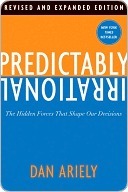More on this book
Community
Kindle Notes & Highlights
humans rarely choose things in absolute terms. We don't have an internal value meter that tells us how much things are worth. Rather, we focus on the relative advantage of one thing over another, and estimate value accordingly.
most people don't know what they want unless they see it in context.
we are always looking at the things around us in relation to others.
we not only tend to compare things with one another but also tend to focus on comparing things that are easily comparable—and avoid comparing things that cannot be compared easily.
ONCE YOU SEE the decoy effect in action, you realize that it is the secret agent in more decisions than we could imagine.
It even helps us decide whom to date—and, ultimately, whom to marry.
RELATIVITY HELPS US make decisions in life. But it can also make us downright miserable. Why? Because jealousy and envy spring from comparing our lot in life with that of others.
the more we have, the more we want. And the only cure is to break the cycle of relativity.
that in order to make a man covet a thing, it is only necessary to make the thing difficult to attain.”
Thus the first anchor influences not only the immediate buying decision but many others that follow.
Anchoring influences all kinds of purchases.
It seems that we get used to the particularities of our housing markets and don't readily change. The only way out of this box, in fact, is to rent a home in the new location for a year or so. That way, we adjust to the new environment—and, after a while, we are able to make a purchase that aligns with the local market.
anchors have an enduring effect for present prices as well as for future prices.
“If I listened to the first sound for x cents, and listened to the second sound for x cents as well, then I can surely do this one for x cents, too!”
our first decisions resonate over a long sequence of decisions.
First impressions are important,
Starbucks did everything in its power, in other words, to make the experience feel different—so different that we would not use the prices at Dunkin' Donuts as an anchor, but instead would be open to the new anchor that Starbucks was preparing for us.
in terms of our personal lives, we can actively improve on our irrational behaviors. We can start by becoming aware of our vulnerabilities.
With everything you do, in fact, you should train yourself to question your repeated behaviors.
ANOTHER IMPLICATION OF arbitrary coherence has to do with the claimed benefits of the free market and free trade.


